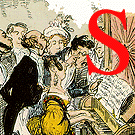[The following passage comes from the author's Robert Louis Stevenson — George P. Landow.]

tevenson's delicate health during his early years made a regular school training impossible. When he was seven years old he was sent to a preparatory school, but after a few weeks he fell ill, and was withdrawn, and he did not return to school until two years later. In 1861 he was sent to the Edinburgh Academy, the principal school of Edinburgh; and he remained there for a year and a half, attending more or less regularly. His teacher was Mr D'Arcy Wentworth Thompson, a famous scholar and teacher, and the author of that delightful book, Day-dreams of a Schoolmaster. For one term, while his mother was abroad, he was sent to an English boarding-school in Middlesex. But his school-days left very little mark upon him. His father, he tells us, had a "contempt for all the ends, processes, and ministers of education." He despised school successes and encouraged his son's natural aversion to school tasks. His mother, indeed, felt differently; and in the journal she kept during these years her son's place in class is carefully noted. But she had few successes to record: Robert Louis Stevenson was undoubtedly an idle and lukewarm scholar.



Three influences on RLS's education: Left: His father, Thomas Stevenson, an expert on lighthouse illumination. Middle: His mother. Right: Cummie, his nurse. [Click on these images for larger pictures.]
His true education he received at home, from his mother and his nurse 'Cummie.' They read to him and talked to him and encouraged him to make efforts for himself. He taught himself his letters by looking at the illustrated papers during his recovery from a severe illness, and by the time he was eight years old he could read and write fluently. Even before this he had attempted original composition. When he was only six his uncle David offered a prize to the one among his children and his nephews who should write the best History of Moses. Louis dictated his version to his mother on five successive Sunday evenings, and illustrated her manuscript with drawings of the Israelites crossing the Red Sea carrying unwieldy portmanteaux and smoking huge cigars. A Bible picture book was awarded him as an extra prize. " From that time forward," says his mother, " it was the desire of his heart to be an author." From this ambition he never swerved, though, like the rest of his family, he felt strongly the call to a life of adventure and active effort. He grew up in an atmosphere like that which had so strongly influenced his father. All around him were people whose main interests were concerned with the sea, and whose talk was chiefly of its perils and adventures. Father, uncles, cousins — nearly all were, or aspired to be, lighthousebuilders. All were proud of the triumphs the family had won, and not one was prouder than little Robert Louis. The strength of his desire to be an author is proved in that it entirely conquered the strong hereditary tendency toward the fascinating calling of his fathers; but the effect of this early environment was to be seen in him and in his work to the end.
His early religious training had a far stronger influence upon him than his purely intellectual education. 'Cummie ' belonged to the strictest sect of the Presbyterians, and under her care Louis spent, as he tells us, "a Covenanting childhood." He was made to study diligently the Bible, the Shorter Catechism, and the writings of the chief Covenanting divines. "When I was a child," he wrote many years afterward to Mr J. M. Barrie, "and indeed until I was nearly a man, I consistently read Covenanting books. ... I have been accustomed to hear refined and intelligent critics . . . trace down my literary descent from all sorts of people. Well, laigh i' your lug, sir, — the clue was found. My style is from the Covenanting writers."
He was taught, moreover, that novels, cards, and the theatre were traps set by the devil to catch souls and that the Presbyterian hymns were finer than all the songs of the ungodly. He received this doctrine eagerly, and his strictness in applying it exceeded that of his teacher. 'Cummie' did her best to make the religion that she taught attractive to her charge, and although he suffered sometimes from the nervous terrors that attack highly sensitive children, he chiefly associated it with stirring and delightful experiences, grateful to his imagination as well as spiritually uplifting. "It is you that gave me a passion for the drama, Cummie," he once said to his old nurse before a roomful of people. 'Cummie' was astounded and a little indignant. " Me, Master Lou! " she answered, " I never put foot inside a playhouse in my life." " Ay, woman," he responded, "but it was the grand dramatic way ye had of reciting the hymns." [25-27]
Bibliography
Cruse, Amy. Robert Louis Stevenson. George G. Harrap, 1905 Internet Archive version of a copy in the University of Connecticut Library. Web. 9 October 2014.
Last modified 10 October 2014